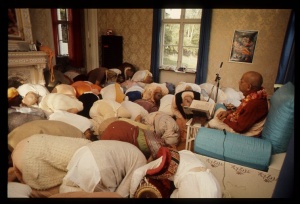CC Antya 3.142 (1975): Difference between revisions
(Vanibot #0027: CCMirror - Mirror CC's 1996 edition to form a basis for 1975) |
(Vanibot #0020: VersionCompareLinker - added a link to the Version Compare feature) |
||
| Line 2: | Line 2: | ||
<div style="float:left">'''[[Sri Caitanya-caritamrta (1975)|Śrī Caitanya-caritāmṛta (1975)]] - [[CC Antya (1975)|Antya-līlā]] - [[CC Antya 3 (1975)|Chapter 3: The Glories of Śrīla Haridāsa Ṭhākura]]'''</div> | <div style="float:left">'''[[Sri Caitanya-caritamrta (1975)|Śrī Caitanya-caritāmṛta (1975)]] - [[CC Antya (1975)|Antya-līlā]] - [[CC Antya 3 (1975)|Chapter 3: The Glories of Śrīla Haridāsa Ṭhākura]]'''</div> | ||
<div style="float:right">[[File:Go-previous.png|link=CC Antya 3.141 (1975)|Antya-līlā 3.141]] '''[[CC Antya 3.141 (1975)|Antya-līlā 3.141]] - [[CC Antya 3.143 (1975)|Antya-līlā 3.143]]''' [[File:Go-next.png|link=CC Antya 3.143 (1975)|Antya-līlā 3.143]]</div> | <div style="float:right">[[File:Go-previous.png|link=CC Antya 3.141 (1975)|Antya-līlā 3.141]] '''[[CC Antya 3.141 (1975)|Antya-līlā 3.141]] - [[CC Antya 3.143 (1975)|Antya-līlā 3.143]]''' [[File:Go-next.png|link=CC Antya 3.143 (1975)|Antya-līlā 3.143]]</div> | ||
{{CompareVersions|CC|Antya 3.142|CC 1975|CC 1996}} | |||
{{RandomImage}} | {{RandomImage}} | ||
==== TEXT 142 ==== | ==== TEXT 142 ==== | ||
| Line 32: | Line 31: | ||
<div class="purport"> | <div class="purport"> | ||
Stalwart, highly advanced Vaiṣṇava devotees are not interested in seeing prostitutes, but when a prostitute or any other fallen soul becomes a Vaiṣṇava, stalwart Vaiṣṇavas are interested in seeing them. Anyone can be turned into a Vaiṣṇava if he or she follows the Vaiṣṇava principles. A devotee who follows these principles is no longer on the material platform. Therefore, it is | Stalwart, highly advanced Vaiṣṇava devotees are not interested in seeing prostitutes, but when a prostitute or any other fallen soul becomes a Vaiṣṇava, stalwart Vaiṣṇavas are interested in seeing them. Anyone can be turned into a Vaiṣṇava if he or she follows the Vaiṣṇava principles. A devotee who follows these principles is no longer on the material platform. Therefore, it is one's strict adherence to the principles that should be considered, not the country of one's birth. Many devotees join our Kṛṣṇa consciousness movement from Europe and America, but one should not therefore consider them European Vaiṣṇavas or American Vaiṣṇavas. A Vaiṣṇava is a Vaiṣṇava and should therefore be given all the respect due a Vaiṣṇava. | ||
</div> | </div> | ||
Latest revision as of 01:03, 27 January 2020

A.C. Bhaktivedanta Swami Prabhupada
TEXT 142
- prasiddhā vaiṣṇavī haila parama-mahāntī
- baḍa baḍa vaiṣṇava tāṅra darśanete yānti
SYNONYMS
prasiddhā—celebrated; vaiṣṇavī—devotee of the Lord; haila—became; parama-mahāntī—very advanced; baḍa baḍa vaiṣṇava—many recognized, highly situated devotees; tāṅra—her; darśanete—to see; yānti—used to go.
TRANSLATION
Thus the prostitute became a celebrated devotee. She became very advanced in spiritual life, and many stalwart Vaiṣṇavas would come to see her.
PURPORT
Stalwart, highly advanced Vaiṣṇava devotees are not interested in seeing prostitutes, but when a prostitute or any other fallen soul becomes a Vaiṣṇava, stalwart Vaiṣṇavas are interested in seeing them. Anyone can be turned into a Vaiṣṇava if he or she follows the Vaiṣṇava principles. A devotee who follows these principles is no longer on the material platform. Therefore, it is one's strict adherence to the principles that should be considered, not the country of one's birth. Many devotees join our Kṛṣṇa consciousness movement from Europe and America, but one should not therefore consider them European Vaiṣṇavas or American Vaiṣṇavas. A Vaiṣṇava is a Vaiṣṇava and should therefore be given all the respect due a Vaiṣṇava.